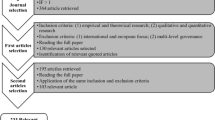Abstract
In this paper we report on our experiences with using network analysis to discern and analyse ethical issues in research into, and the development of, a new wastewater treatment technology. Using network analysis, we preliminarily interpreted some of our observations in a Group Decision Room (GDR) session where we invited important stakeholders to think about the risks of this new technology. We show how a network approach is useful for understanding the observations, and suggests some relevant ethical issues. We argue that a network approach is also useful for ethical analysis of issues in other fields of research and development. The abandoning of the overarching rationality assumption, which is central to network approaches, does not have to lead to ethical relativism.
Similar content being viewed by others
References
Shrader-Frechette, K. S. (1991) Risk and Rationality. Philosophical Foundations for Populist Reform, University of California Press, Berkeley etc.
Hansson, S. O. (2004) Philosophical Perspectives on Risk. Techne 8: 10–35.
van de Poel, I. R., Zwart, S. D., Brumsen, M. & van Mil, H. G. J. (2005) Risks of Aerobic Granular Sludge Technology; Ethical and Methodological Aspects, in: Bathe, S., de Kreuk, M. K., Mc Swain, B. S. & Schwarzenbeck, N. (eds.) Aerobic Granular Sludge, IWA Publishing, London, pp. 143–154
Klijn, E. H. (1997) Policy Networks. An Overview, in: Kickert, W. J. M., Klijn, E. H. & Koppenjan, J. F. M. (eds.) Managing Complex Networks. Strategies for the Public Sector, Sage, London, pp. 14–34
Pinch, T. & Bijker, W. (1987) The Social Construction of Facts and Artifacts. Or How the Sociology of Science and the Sociology of Technology Might Benefit Each Other, in: Bijker, W., Hughes, T. P. & Pinch, T. (eds.) The Social Construction of Technological Systems; New Directions in the Sociology and History of Technology, MIT Press, Cambridge, pp. 17–50
Bijker, W. (1995) Of Bicycles, Bakelite, and Bulbs. Toward a Theory of Sociotechnical Change, MIT Press, Cambridge (Ma.).
Callon, M. (1986) The Sociology of an Actor-Network: The Case of the Electric Vehicle, in: Callon, M., Law, J. & Rip, A. (eds.) Map** the Dynamics of Science and Technology, Sociology of Science in the Real World, Macmillan Press, Hampshire & London, pp. 72–102
Latour, B. (1987) Science in Action. How to Follow Scientists and Engineers through Society, Harvard University Press, Cambridge (Ma.).
Law, J. & Callon, M. (1988) Engineering and Sociology in a Military Aircraft Project: A Network Analysis of Technological Change. Social Problems 35: 284–297.
Hakansson, H. (ed.) (1989) Industrial Technological Development. A Network Approach, Routledge, London.
Elzen, B., Enserink, B. & Smit, W. A. (1996) Socio-Technical Networks. How a Technology Studies Approach May Help to Solve Problems Related to Technical Change. Social Studies of Science 26: 95–141.
Smit, W. A., Elzen, B. & Enserink, B. (1998) Coordination in Military Socio-Technical Networks: Military Needs, Requirements and Guiding Principles, in: Disco, C. & Van der Meulen, B. (eds.) Getting New Technologies Together. Studies in Making Sociotechnical Order, Walter de Gruyter, Berlin, pp. 71–106
Schneider, V. (1992) The Structure of Policy Networks. A Comparison of the ‘Chemical Control’ and ‘Telecommunications’ Policy Domain in Germany. European Journal of Political Research 21: 109–129.
Bressers, H., Huitema, D. & Kuks, S. M. M. (1994) Policy Networks in Dutch Water Policy. Environment Politics 3: 24–51.
Boudon, R. (1981) The Logic of Social Action. An Introduction to Sociological Analysis, Routledge & Kegan Paul, London etc.
Mitchell, R. K., Agle, B. R. & Wood, D. J. (1997) Towards a Theory of Stakeholder Identification and Salience. Defining the Principle of Who and What Really Counts. Academy of Management Review 22: 853–896.
Dery, D. (1984) Problem Definition in Public Policy, University Press of Kansas, Lawrence, Kansas.
Kingdon, J. W. (1984) Agendas, Alternatives and Public Policies, Little, Brown and Company, Toronto.
Albert de la Bruheze, A. A. (1992) Political Construction of Technology; Nuclear Waste Disposal in the United States, Eburon, Delft.
Grin, J. & van der Graaf, H. (1996) Implementation as Communicative Action. An Interpretive Understanding of Interactions between Policy Actors and Target Groups. Policy Sciences 29: 291–319.
Slovic, P. (2000) The Perception of Risk, Earthscan, London.
Thompson, D. F. (1980) Moral Responsibility and Public Officials. American Political Science Review 74: 905–916.
Bovens, M. (1998) The Quest for Responsibility. Accountability and Citizenship in Complex Organisations, Cambridge University Press, Cambridge.
Stern, P. C. & Feinberg, H. V. (1996) Understanding Risk: Informing Decisions in a Democratic Society, National Academy Press, Washington.
Schot, J. & Rip, A. (1997) The Past and Future of Constructive Technology Assessment. Technological Forecasting and Social Change 54: 251–268.
van de Poel, I. & Zwart, S. D. (submitted) Reflective Equilibrium in R&D Networks. Science, Technology & Human Values submitted for publication.
Author information
Authors and Affiliations
Corresponding author
Rights and permissions
About this article
Cite this article
Zwart, S.D., van de Poel, I., van Mil, H. et al. A network approach for distinguishing ethical issues in research and development. SCI ENG ETHICS 12, 663–684 (2006). https://doi.org/10.1007/s11948-006-0063-2
Received:
Revised:
Accepted:
Issue Date:
DOI: https://doi.org/10.1007/s11948-006-0063-2




